
Journal for the Study of Judaism
metrics 2024
Advancing Scholarship in Jewish Studies
Introduction
Journal for the Study of Judaism, published by BRILL, serves as a vital platform for scholarly discourse in the fields of History, Literature and Literary Theory, and Religious Studies. With a commendable impact factor and ranking in the Q2 and Q3 quartiles across its respective categories, this journal facilitates high-quality research that explores the multi-faceted dimensions of Jewish studies from its inception in 1970 to the present day. For those who engage with the journal, the commitment to rigorous peer-review processes ensures publication of significant articles that advance knowledge and foster discussions within the academic community. As an essential resource for researchers, professionals, and students alike, the journal continues to enrich the understanding of Judaism through esteemed contributions of scholarship and critical analysis. The journal’s rich legacy and commitment to excellence make it an indispensable tool for those seeking to deepen their insight into Jewish studies and its broader implications.
Metrics 2024
 0.12
0.12 0.60
0.60 0.60
0.60 22
22Metrics History
Rank 2024
Scopus
IF (Web Of Science)
JCI (Web Of Science)
Quartile History
Similar Journals
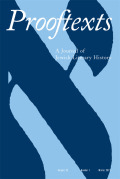
PROOFTEXTS-A JOURNAL OF JEWISH LITERARY HISTORY
Fostering Dialogue on Jewish Literary EvolutionPROOFTEXTS: A Journal of Jewish Literary History, published by Indiana University Press, is a premier academic journal dedicated to the exploration and critical analysis of Jewish literature and its historical contexts. With an ISSN of 0272-9601 and an E-ISSN of 1086-3311, this journal not only serves as a platform for innovative scholarship but also aims to foster dialogue among scholars in the fields of Cultural Studies, Literature and Literary Theory, and Religious Studies. As evidenced by its 2023 Scopus ranking—place within the third quartile in Cultural Studies and Religious Studies, and second quartile in Literature and Literary Theory—PROOFTEXTS stands out as a significant contributor to academic literature, attracting a diverse readership of researchers, professionals, and students alike. The journal’s commitment to open access is limited, thus ensuring a selective dissemination of high-quality research materials. Researchers are encouraged to contribute their insights and engage with the intricate narratives that shape Jewish literary heritage from 2002 to its convergence during select years, highlighting the ongoing evolution and relevance of this vibrant field. For in-depth understanding of Jewish literary history, PROOFTEXTS remains an indispensable resource.
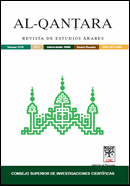
AL-QANTARA
Illuminating Connections Between Culture and History.AL-QANTARA, published by the Consejo Superior Investigaciones Cientificas (CSIC), is a prestigious academic journal that has been at the forefront of interdisciplinary research in the fields of Cultural Studies, History, and Literature and Literary Theory since its inception in 1984. Renowned for its commitment to open access since 1996, the journal promotes a comprehensive understanding of the interconnectedness of cultural narratives and historical discourse, making it an invaluable resource for researchers and students alike. With impressive rankings in Scopus—including a top placement in the Q1 category for Literature and Literary Theory and Q2 in both Cultural Studies and History—AL-QANTARA effectively bridges theoretical insights with empirical research, contributing to robust academic dialogue and innovation. Operating out of Madrid, Spain, it stands as a pillar of scholarly excellence, offering a platform for diverse voices in the humanities to share their findings and engage with critical contemporary issues.
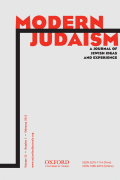
MODERN JUDAISM
Connecting Tradition with Contemporary DiscourseMODERN JUDAISM is a premier journal dedicated to the multifaceted exploration of Jewish culture, history, and religious practice, providing a significant platform for scholarly discourse since its inception in 1981. Published by Oxford University Press Inc in the United States, this journal stands out with its diverse engagement across disciplines, reflected in its commendable 2023 category quartiles: Q2 in Cultural Studies and History, Q1 in Religious Studies, and notable rankings in Political Science and Sociology. With an impact factor that underscores its rigorous peer-review process and scholarly relevance, MODERN JUDAISM serves as an essential resource for researchers, professionals, and students alike, fostering an academic environment conducive to innovative ideas and comprehensive studies. Although not open access, the journal remains crucial for anyone looking to deepen their understanding of contemporary Jewish thought and its intersection with broader cultural and political currents. For further inquiry or submissions, please refer to the Journals Department at 2001 Evans Rd, Cary, NC 27513.

Nordisk Judaistik-Scandinavian Jewish Studies
Unraveling the Complexities of Jewish Identity in ScandinaviaNordisk Judaistik-Scandinavian Jewish Studies is a distinguished academic journal dedicated to the exploration of Jewish culture, history, and religious practices in the Scandinavian context. Published by the DONNER INSTITUTE FOR RESEARCH ON RELIGIOUS AND CULTURAL HISTORY in Finland, this journal has been an open access platform since 2016, allowing easy dissemination of knowledge and fostering scholarly communication among researchers, educators, and students. With a variety of subjects encompassing Anthropology, Cultural Studies, History, and Religious Studies, the journal has achieved commendable recognition, with its latest rankings placing it in Q2 in several categories according to the 2023 Scopus rankings. The journal's significant contribution to the field is evident through its impact, evidenced by its strategic position within its respective quartiles. By bridging interdisciplinary methodologies and Jewish studies within a Scandinavian framework, Nordisk Judaistik serves as an essential resource for those engaged in the complexities and nuances of Jewish heritage and identity in the region.

Review of Rabbinic Judaism
Unveiling the Rich Tapestry of Rabbinic HistoryReview of Rabbinic Judaism is a distinguished academic journal published by BRILL, focusing on the intricate history and development of Rabbinic Judaism from its origins to contemporary implications. Since its inception in 1998, it has catered to a broad audience of researchers, professionals, and students interested in the historical and religious dimensions of Judaism. The journal is currently recognized within the Q2 category in both History and Religious Studies as of 2023, indicating its significant role in scholarly discourse. Although it is not an Open Access journal, it remains accessible through various academic institutions and libraries globally. The journal's broad scope allows for diverse articles that explore theological, cultural, and textual analysis, making it a vital resource for those dedicated to the study of Jewish texts and traditions. Located in the Netherlands, Review of Rabbinic Judaism continues to contribute to the academic landscape by fostering a deeper understanding of Rabbinic thought.
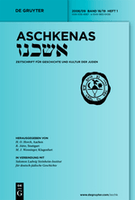
Aschkenas-Zeitschrift fuer Geschichte und Kultur der Juden
Unveiling Rich Narratives of Jewish LifeAschkenas-Zeitschrift fuer Geschichte und Kultur der Juden, published by WALTER DE GRUYTER GMBH, is a distinguished academic journal that delves into the rich history and cultural heritage of Jewish communities. Based in Germany, this journal is indexed under the ISSN 1016-4987 and E-ISSN 1865-9438, making its contributions accessible to an international audience. Although it currently operates without open access options, the journal serves as an important platform for researchers in the fields of Arts and Humanities, History, Literature and Literary Theory, and Religious Studies, as evidenced by its publication history from 1996 to 2023. While ranked in the fourth quartile across various categories on Scopus, the journal provides critical insights and interdisciplinary approaches that enrich the understanding of Jewish cultural narratives. Researchers, professionals, and students alike will find valuable content that not only highlights historical perspectives but also engages with contemporary cultural discussions. This journal remains a vital resource for those seeking to deepen their knowledge and contribute to ongoing dialogues in Jewish studies.
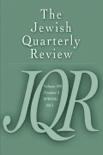
JEWISH QUARTERLY REVIEW
Charting New Territories in Jewish StudiesJewish Quarterly Review, published by University of Pennsylvania Press, is a distinguished academic journal that delves into the multifaceted realms of Jewish culture, history, and religious studies. With a rich publication history dating back to 1953 and an impressive track record of rigorous scholarship, this journal maintains a Q2 ranking in key categories such as Cultural Studies, History, and Religious Studies in 2023, placing it among the top-tier journals in its field. The ISSN number 0021-6682 and the E-ISSN 1553-0604 ensure that its scholarship is widely accessible and traceable in academic databases. While the journal is not open access, it remains an essential resource for researchers, professionals, and students seeking in-depth analysis and perspectives on Jewish thought and heritage. The JQR is known for its editorial commitment to enhancing understanding and dialogue across cultural and historical contexts, making it an invaluable asset for anyone engaged in Jewish studies and related disciplines. With its headquarters in Philadelphia, PA, the journal continues to foster scholarly engagement and critical discourse on Jewish identity and experience through its carefully curated articles and reviews.

Journal of Early Christian History
Exploring the Foundations of Faith and CultureJournal of Early Christian History, published by ROUTLEDGE JOURNALS, TAYLOR & FRANCIS LTD, is a leading academic journal dedicated to the exploration of the early Christian period, focusing on historical, religious, and cultural dynamics that shaped the faith and its followers. With an ISSN of 2222-582X and an E-ISSN of 2471-4054, this journal serves as a vital resource for researchers and scholars in the fields of History and Religious Studies, holding a solid Q2 ranking in both categories for 2023. Its diverse spectrum includes critical analyses, innovative methodologies, and interdisciplinary studies, contributing to a deeper understanding of early Christian traditions. Operating from 2-4 Park Square, Milton Park, Abingdon, OX14 4RN, Oxford, England, the journal encourages open dialogues and scholarly exchange, fostering a rich academic community. Enhance your research with cutting-edge insights, as the journal continues to uphold its commitment to excellence through rigorous peer-review and impactful disseminations in the realm of early Christian history.
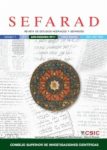
SEFARAD
Fostering Interdisciplinary Dialogue Across CulturesSEFARAD, published by the CONSEJO SUPERIOR INVESTIGACIONES CIENTIFICAS-CSIC, is a renowned open-access journal that has been a pivotal platform for scholarly communication since its inception in 1996. Based in Spain, it caters to a diverse readership across multiple disciplines, including Cultural Studies, History, Literature and Literary Theory, Religious Studies, and Linguistics and Language. The journal has successfully established itself within respected academic circles, achieving Q2 rankings in both History and Literature and Literary Theory as per the 2023 category quartiles, emphasizing its significance in these fields. With a commitment to fostering interdisciplinary dialogue and enhancing understanding of the Jewish heritage and culture in the Iberian Peninsula, SEFARAD presents original research articles, comprehensive reviews, and critical essays that inspire further scholarly inquiry. Researchers, professionals, and students alike will find this journal an invaluable resource for contemporary studies in its vibrant subject areas.
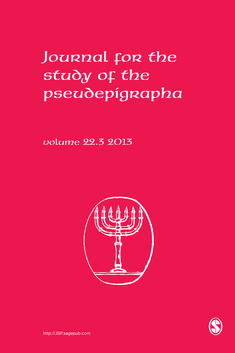
Journal for the Study of the Pseudepigrapha
Cultivating a Community of Pseudepigraphal ScholarsThe Journal for the Study of the Pseudepigrapha, published by SAGE Publications Ltd, is an esteemed periodical dedicated to advancing the scholarly exploration of pseudepigraphal literature and its impact on religious studies. With an ISSN of 0951-8207 and E-ISSN 1745-5286, this journal provides a vital platform for researchers, professionals, and students alike who seek to deepen their understanding of the diverse literary and theological dimensions of pseudepigrapha. Operating from the United Kingdom, the journal's output spans from 1987 to 2024, ensuring a rich archive of insights and discussions relevant to contemporary debates within the field. It currently holds a categorization in the fourth quartile of Religious Studies (Q4) and ranks 308 out of 644 in the Scopus database, highlighting its established presence among a growing community of scholars. The journal does not currently offer Open Access, though its content remains highly valuable for those engaged in the investigation of ancient texts beyond the canonical scriptures. By fostering rigorous analysis and multifaceted discourse, the Journal for the Study of the Pseudepigrapha continues to make significant contributions to the understanding of identity, tradition, and textual interpretation within various cultural contexts.